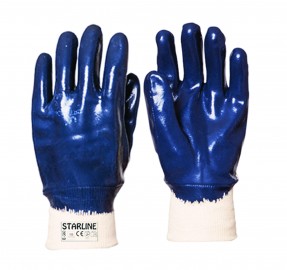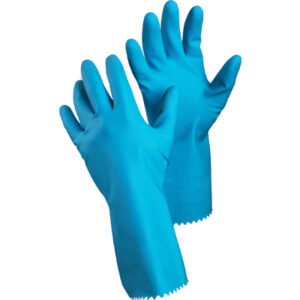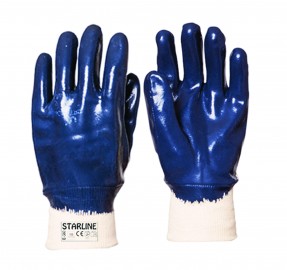Guide to materials for the production of chemically resistant gloves

 Today, there is a fairly large number of different materials that allow you to protect workers from the harmful effects of acids, alkalis, salts of heavy metals, caustic liquids and other chemically active substances. Our quick guide to the materials used to make chemical resistant gloves will help you with this.
Today, there is a fairly large number of different materials that allow you to protect workers from the harmful effects of acids, alkalis, salts of heavy metals, caustic liquids and other chemically active substances. Our quick guide to the materials used to make chemical resistant gloves will help you with this.
What are chemical resistant gloves?
There are many different types of chemical resistant gloves on the market. They are typically made from materials such as latex, nitrile, PVC, neoprene, butyl, and viton-butyl, as well as a combination of the above. Depending on the severity of the chemical hazard and the area of application, some chemical resistant gloves are much more suitable than others.
That's why it's important to learn about the pros and cons of each of the different materials. Let's look at the important differences between them.
Latex:

Often, latex receives a negative evaluation from consumers. However, latex can actually be very useful for a variety of applications, such as laboratory use, food processing, chemical manufacturing, assembly, agriculture, pharmaceuticals, and other industries.
Latex is a flexible, stretchy and durable material, but unfortunately it doesn't offer much protection against punctures or abrasions. This is important to keep in mind if you are looking for a glove that will provide you with reliable protection not only from chemicals, but also from mechanical influences.
However, if you are looking for protection purely against chemical influences, then latex can be a great choice! It resists nitric acid, hydrochloric acid, sulfuric acid, methanol and many other chemicals, including:
- Formaldehyde
- Methanol
- Acetone
- Phosphoric acid
- Potassium hydroxide
- Sodium hydroxide
According to the University of Berkeley, latex also protects against biological and water-borne materials. As you can see, latex can be an extremely useful material for those who need to protect their hands from chemical hazards.
However, when it comes to latex, the main disadvantage is the possibility of an allergic reaction. For this reason, people with latex allergies should choose chemical-resistant gloves made from a different material.
PVC:

PVC or polyvinyl chloride, a material that has good mechanical strength, retains excellent flexibility, and also provides good adhesion. For this reason, they are excellent for commercial fishing, maintenance, mining, mechanical work, construction and petrochemical applications.
PVC is an excellent choice for many jobs because it resists several chemicals, including ammonium hydroxide, benzyl alcohol, boric acid, creosote, fluorides, silicates, and dilute sulfuric acid. PVC will also protect your hands from the following substances:
Sodium hypochlorite
Photodetector latch
Phosphoric acid
Methanol
Household detergents
Ethylene glycol
Chromic acid
According to the University of Berkeley, chemically resistant PVC gloves will protect you from acids, amines, peroxides and fats. PVC gloves are an excellent choice for many industries, but PVC is not recommended if you are looking for special protection against organic solvents or the work involves contact with heated surfaces or substances, as it offers poor heat resistance.
Nitrile:

Nitrile gloves provide a wide range of protection against various hazards. Hypoallergenicity and high puncture resistance are also among the advantages of this material. Nitrile is less elastic, but if a puncture or tear occurs, it is easier to detect in a nitrile glove than in other materials.
In addition, nitrile also resists solvents, grease, some acids and bases, and oils. Nitrile gloves are an excellent choice if you are going to be working with any of the following chemicals:
Aniline
Asphalt
Benzyl alcohol
Brake fluid
Cutting oil
Cyclohexane
Fertilizers
Gasoline
Household detergents
Mineral oil
Oil
Poultry
Xylene
And many, many others
Because it protects against a number of hazards and does not cause an allergic reaction, nitrile is one of the most popular materials for chemically resistant gloves. However, it's important to understand that the type of chemical-resistant glove you need will depend on what chemicals or chemical compounds you're handling and what other hazards (such as punctures) are present in your workplace.













